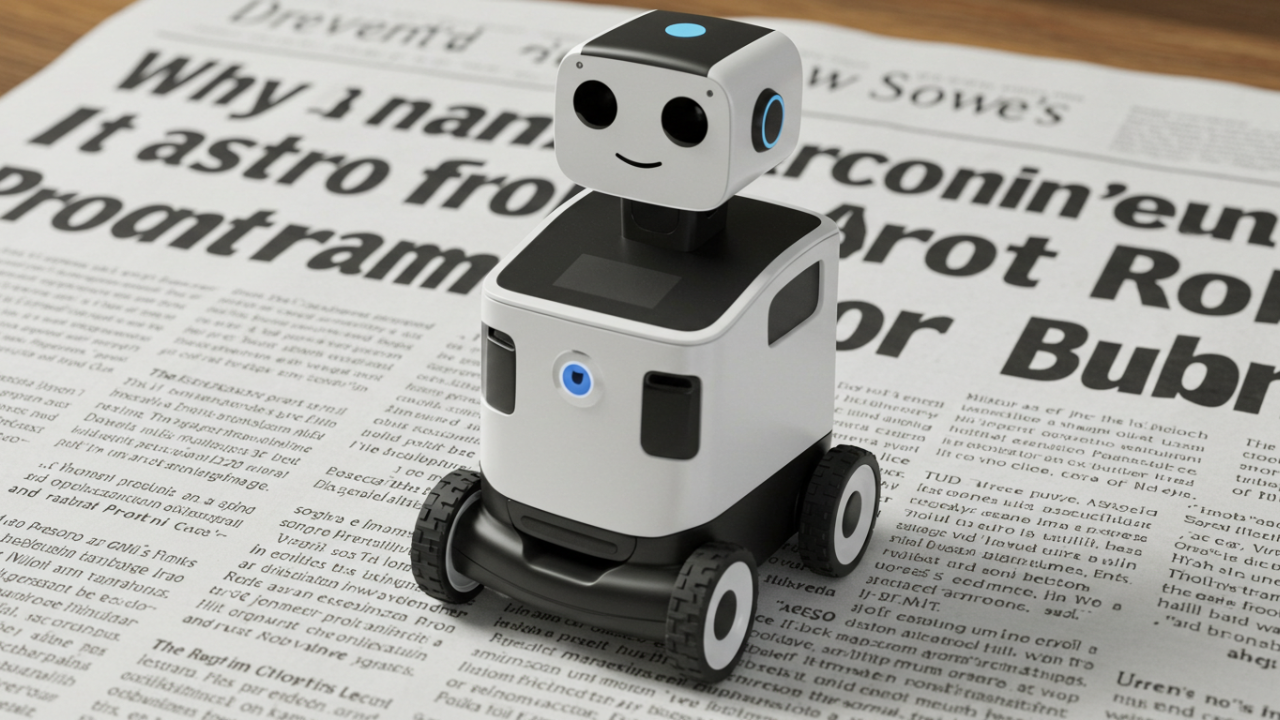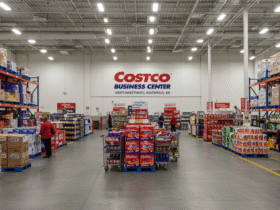Remember the first time you saw Amazon’s Astro robot? I surely do. The Astro rolled over a surface with its sleek and almost charming frame, and its wide digital eyes blinked at you as if they comprehended your every need even before you voiced it. It looked like a tiny companion that moved with the look of confidence typically associated with an office vacuum — quiet, yet much more intelligent.
The robot’s promise was bold. This was more than just a novelty. Astro was aimed to be a revolutionary business partner. Initially, it appeared they were on the right path.
Now, we find ourselves asking the questions. Why did Amazon decide to terminate a contract that was meant to evolve the use of robots in day to day operations?
If you are anything like me, a person who views tech from both a fan and job perspective, you have probably asked what went wrong. Alternatively, and most importantly, what is the lesson I should learn from this before my next investment in tech.
Let’s unpack this. Because uncovering that soft shutdown reveals a narrative that serves anyone concerned with their enterprise, finances, and the march of robots in the future of business.
The Hype That Built the Dream
Doesn’t it feel like ideas sometimes go viral even when the product is not fully baked? That was the case with Astro.
As usual, Amazon’s marketing machine did what it does best: It crafted a narrative that we were all too happy to buy into. The narrative where a small, helpful robot could patrol our offices, keep track of stocks, make security checks less of a chore, and glide around the office like a loyal aide.
I’ll admit it. I was fascinated. So too were many other people running small businesses, managing co-working offices, or trying their hand at digitizing legacy operations.
People were not really wishing to remove the human elements of their operations. Their vision was a robotic assistant who wouldn’t go AWOL due to illness and wouldn’t lose attention halfway through a shift.
Astro’s promotional materials prepared people for the future by depicting the robot zooming around clean, uncluttered spaces obeying voice commands and even recognizing faces.
It was eye-catching and futuristic — The world was Astro’s oyster. As many learnt the hard way, what a smoothly designed showroom fills with empty dreams and shows doesn’t always translate into practicality.
The Business Use Case That Couldn’t Stick
You see, Astro’s promise wasn’t about style. It was about utility. Could it truly make business operations smoother or more secure?
Things got messy, as they always do in reality. Small business owners started to realize that Astro required a lot more supervision than anticipated.
It struggled with cluttered environments and recognizing all sorts of everyday variables. For example, a stack of boxes left in a hallway or a customer standing just a tad too long in its path.
Yes, it could patrol a room, but it wasn’t reading between the lines. It wasn’t adjusting to subtle context.
That’s not lack of imagination – imagination has nothing to do with that. And for business owners hoping to do more with less, time is everything. If a machine needs babysitting, then it’s not solving any problems. It’s another headache to deal with.
Astro’s greatest difficulty was not a total failure of the company. Rather, it was that they did not meet expectations, especially in the areas that were most important to the customers. Astro was not achieving the goals of increasing business productivity, safety, or efficiency. In a competitive environment, those three things are everything.
When Tech Is Cool But Not Useful Enough
This is the part where we, as business owners, managers, or simply individuals who care about the processes, should take a step and reflect. Because it is very easy to get excited about the latest gadgets. But it is also easy to forget that hoopla does not always equate to helpful.
I cannot deny that Astro was cool. But he was unable to climb stairs, dealt poorly with tight spaces, and while capable of video capture, he wasn’t any more intelligent than a simple camera system mounted on a wall. In fact, a number of people I’ve spoken with ended up replacing Astro with fixed cameras and basic alarm systems because they were, cheaper, more reliable, and easier to maintain.
The irony here is sharp. A robot meant to move freely is utterly outdone by stationary devices. That isn’t a small lack. That is a blunder in estimating businesses’ requirements.
When the cost is disproportionate to the outcome, smart businesses steer clear, and Amazon, for all its reach and resources, has seen that. For this reason, the program was quietly wound down. Not with drama or fanfare, just with a silent exit. Astro has, for businesses, ceased to make sense.
What Amazon Learned — And What You Should, Too
This is not merely about automation. It is about tools we choose to integrate in our businesses. More often than not, I have witnessed so many teams become enamored with whether a tool’s feature-set includes everything they desire, only to be disappointed when the results don’t measure up.
Amazon learned something about timing. They figured out that business owners are looking for technology that seamlessly integrates into their workflows, not something that involves reworking entire systems and endless troubleshooting. They also learned that charm isn’t enough. Practical wins…Every single time.
You, dear reader, might be going through something similar at this very moment. Perhaps someone has shown you a new app, a smart system, or even a fancy new widget that promises to revolutionize how you run your operations. My advice would be to try answering the questions Amazon had to address in the painstaking manner.
Does it indeed save you time? Does it fix actual pain points? Will it be adopted by your people willingly and without friction? And the most important: if it were to cease existing tomorrow, would your business miss it?
As it turns out, most businesses did not notice the absence of Astro.
Where Things Go From Here
In case you missed it, Amazon has Astro, their home robot, set on the backburner. To be fair, they’ve only shifted attention for now — perhaps the home version of Astro is where it was always meant to be. Astro helps with tasks such as event reminders, monitoring pets, as well as serving as a home security aide, making it ideal for pet owners. The task a single robot has to preform in a household is more limited and structured.
So goes everything with Astro for the business world. It illustrates, perhaps bluntly, what the state of automation is now. Automation will become reality at some point, just not too soon for offices equipped with modern technology.
There is nothing wrong with wanting to work with efficient tools. There is nothing wrong with wanting to equip yourself with proven tried and true solutions. The challenge is figuring out when an old gadget has been dusted off and new promises are only gleaming metal polished, and when improvements are delivered.
Choosing the Right Tech in a Post-Astro World
Let me share a recurring observation I’ve made: the people who best integrate technology into their life or work do not rush to adopt every new trend. Instead, they are the ones who wait for the right fit, do background checks, ask the right questions, and only commit after they are convinced of the technology’s value.
Astro’s shutdown is a wake-up call for all of us, especially those trying to intelligently scale businesses without squandering resources. At times, we overestimate a technology’s capabilities and thus overexpect what it can do for us. There is wisdom in pulling away from ideas when things fall short of expectations.
Understanding challenges is the first step to resolving them. So ask yourself: what would improve workflow? Is it Mobility, monitoring, or automation? Or is consistency the holy grail? Quite frankly, if it’s consistency that you need, a fixed camera paired with a reliable system will outclass a $1,600 robot any day of the week.
Astro’s appeal was sentimental. It made us think of a world where we had a bit more Jetsons and a little less grind. But hope is devoid without action. And in this world, hope is always secondary to action.
My Opinion for You, the Real Decision-Maker
If you still wonder if Astro was missing much of its potential, let me clarify once more. Astro indeed was in its infancy stage. Undoubtedly, Astro has its potential but because the technology world is on the rise, at some point down the road, these potentially ‘futuristic’ products will be supplemented by something smarter, smaller, and more intuitive to intelligent business mechanics.
So, until then, stay alert as much as possible but don’t chase the next big thing as if it were the Holy Grail. The best tools are the ones that remain offline, fit into the daily schedule seamlessly, act effortlessly, and remove problems without needing a manual thicker than the company handbook.
Astro didn’t account for these essentials, which in turn is what led Amazon to walk away from Astro.
You know the rest of the story. Your people decide its inner workings and the nitty gritty details that are crucial in the day-to-day functioning. So run the tech acquisition process like hiring and retain Robot Legs when optics point at them and value any balance estimation robot for the eyesbehind ‘proven value’ put- this business is after all claiming to be rife with eye-candy toys lacking any staying power.”
And as for why Amazon has pulled the plug on its Astro business robot program, this is the truth. It’s also the information that is likely to keep your business ahead of the game. Not only in theory but in practice.

















Leave a Reply